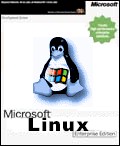 Gimme an O! Gimme an A! Gimme an X! What does that spell? Hoax! Sure, Microsoft’s all about embrace & extend, and they are the masters of the terrible name, but UNG? Please.
Gimme an O! Gimme an A! Gimme an X! What does that spell? Hoax! Sure, Microsoft’s all about embrace & extend, and they are the masters of the terrible name, but UNG? Please.
Tag Archives: software
Internet Explorer lays anchor in 1999, sets sail for the future
The Internet Explorer team has announced a meta tag that instructs Explorer 8 to render the page as if it were a previous version of Explorer. The idea is to maintain the exact same rendering, bugs and all, of previous versions of Explorer, so that layouts designed for older renderers never change.
Why I’ve stopped reporting bugs to Ubuntu
I’ve largely stopped reporting bugs to Ubuntu because of the condescending and dismissive attitude from their developers.
I cut my Linux teeth on RedHat back in 1998, and soon after settled on Debian as the best of several flawed but promising choices of Linux distributions. When I switched to Ubuntu 4.10 in October 2004, I was excited by the promise of a distribution with the quality of Debian and frequent releases and a focus on the desktop.
Today I stumbled across what unfortunately seems like another typical example of what happens when you report a bug to them: aumix in Ubuntu 7.10 was compiled wrong, such that it won’t even launch. Recompiling the source package without making any changes to the source fixes the problem. Instead of just doing that, the Ubuntu developers spent far more time and effort bickering on the bug report and justifying their inaction by referring to official protocol. Shallow thoughts outlines the issues with aumix and contains this quote:
Flyback: Time Machine for Linux
Flyback is an attempt to imitate Leopard’s Time Machine functionality under Linux. More OSS projects would benefit by imitating Apple’s software instead of Microsoft’s. They even claim that “an 3D/opengl view of the directories ‘flying back’ is coming,” which I personally could do without, but hey, whatever floats your folder.
Touched and blown away
I will say that if you are impressed by the “touch features” in the iPhone, you’ll be blown away by what’s coming in Windows 7. –Hilton Locke
Sure, the touch features in Windows 7 may “blow away” the touch features in today’s iPhone (or even 2008’s iPhone). But keep in mind, Windows 7 is not officially due until 2010 and will likely be delayed until 2012 or later, going by Microsoft’s track record. And I doubt Windows 7’s touch features, or any other Windows 7 feature, for that matter, will “blow away” features that Apple’s shipping when Windows 7 does arrive.
OS X native Win32 compatibility layer?
OSNews has collected some tidbits Wine developers discovered about OS X 10.5. Apple may be working on its own, new, OS-native Win32 compatibility layer, and keeping it quiet for now. Out-of-the-box support for running Windows apps would be a killer feature in OS X, and the prospect should certainly scare VMWare, Parallels, and Innotek’s VirtualBox. If it’s true, we probably won’t hear about it officially until Apple unveils a finished, polished product.
It’s almost pointless to mention the other company that should be scared by this prospect.
Update (2007-12-02): Looks like this was one of the rumors around WWDC 2007.
Installing VMWare Workstation 6.0 on Ubuntu 7.10 “Gutsy”
As a general rule, I don’t install applications on my system outside of the package manager. It litters your system with mysterious files that cannot be traced to any particular piece of software, and eventually the files will conflict with packaged files or other manually-installed software. Therefore, Ubuntuforums’ instructions on how to install VMWare Workstation 6.0 are useless to me. But it turns out it’s relatively easy to convert VMWare’s .rpm to a .deb and install VMWare inside the package manager. Here’s how:
The dark future of Mac OS X code-names
There’s a really serious issue that Apple’s facing with the future of OS X: they’ve only got two more Big Cat names to use as code names for OS X versions: Cougar and Lion.
WebKit adds embeddable font support
Embeddable fonts in webpages; we only had to wait nine years for a browser to implement this. Yet another reason to hold my breath for a WebKit browser on Xorg.
I’m not going to say I told you so
The whole flap about Apple “bricking” unlocked and hacked iPhones with the latest software update reminds me of this article I wrote about Kaleidoscope in 2003.
I won’t say I told you so because I didn’t, exactly. (In fact, re-reading my article on Freshmeat makes me cringe; it’s a half-thought-out piece of naiive open-source evangelism.) But looking back, this is a story that gets repeated over and over again. It goes like this:
- A company releases a popular, closed product.
- A third party “hacks” the product and adds killer functionality via an undocumented, reverse-engineered API or infrastructure.
- A future update to the software eliminates the hack or alters the reverse-engineered API enough to eliminate the killer functionality.
- Go back to step 2.
I’m not suprised that this story is being repeated with the iPhone, because if there’s any company that’s extremely likely to take step 3, it’s Apple. Their entire business is based on total control of the whole widget, and they are doing a killer job. It wouldn’t be fair to expect them to even care about whether a new OS will break unofficial uses of hardware interfaces in the iPhone that weren’t documented or intended for third-party use.
It’s an old story, and I’m sure we’ll hear it again someday.